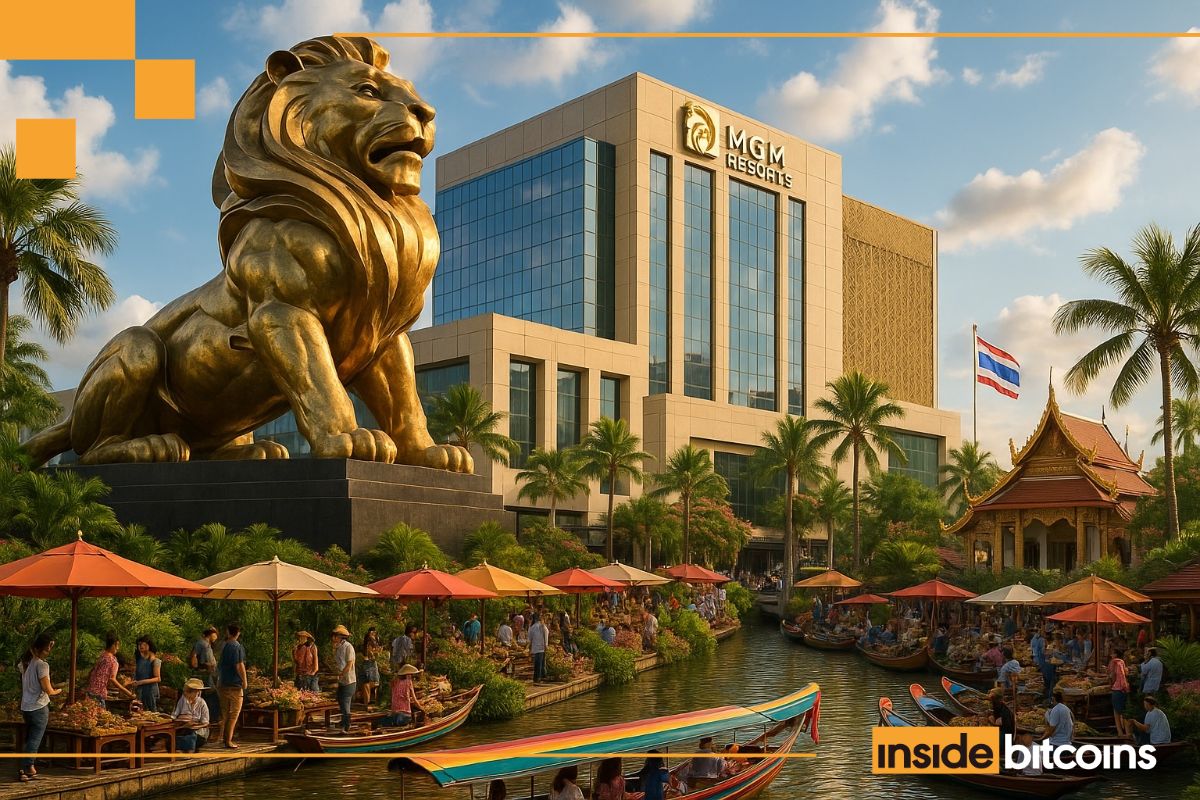The Southeast Asian gaming landscape stands on the precipice of significant transformation as Thailand advances legislation that could establish the country as a major regional casino destination, with American gaming giant MGM Resorts International emerging as a leading potential investor expressing interest in a substantial $3-5 billion Bangkok casino resort project.
MGM’s Strategic Investment Vision for Thailand
MGM Resorts International has positioned itself as a frontrunner in Thailand’s emerging casino market, with company executives outlining specific investment parameters that could shape the country’s entertainment complex development. Ed Bowers, MGM’s President of Global Development, has articulated the company’s interest in deploying between $3 billion and $5 billion for a Bangkok-based integrated resort, marking the first time international operators have publicly disclosed potential investment figures for Thailand’s nascent gaming sector.
The American gaming corporation’s approach emphasizes the necessity for Thailand to establish competitive operational frameworks that align with successful regional models. MGM’s strategy centers on Bangkok’s metropolitan advantages, including its substantial population base of 11.5 million residents and robust tourist infrastructure capable of supporting millions of annual visitors. The capital city’s Suvarnabhumi International Airport processed nearly 61 million passengers in the previous year, with 32.4 million specifically targeting Bangkok as their destination, demonstrating the market’s substantial tourism foundation.
Bowers has indicated that Bangkok’s market characteristics could potentially support multiple casino resorts, though he suggests one comprehensive integrated resort would likely prove sufficient for initial development phases. Gaming analyst Bo Bernhard has projected that two Bangkok resorts could generate revenue streams capable of surpassing Singapore’s gaming market, potentially establishing Thailand among Asia’s largest gaming destinations.
Thailand’s Legislative Evolution and Current Status
Thailand’s journey toward casino legalization represents a dramatic policy shift for a nation that has maintained strict gambling prohibitions since 1935, permitting only state-operated horse racing and lottery systems. The current legislative framework, known as the Entertainment Complex Bill, has undergone significant evolution as Thai lawmakers work to balance economic opportunities with social considerations.
The Thai Cabinet approved the second draft of the Entertainment Complex Bill in March 2025, following initial approval in January of the same year. Deputy Finance Minister Julapun Amornvivat has projected that the casino legislation will be enacted during early 2026, contingent upon completion of comprehensive legislative review processes. The government has established a detailed timeline whereby the draft law will undergo a 45-day Council of State review period before returning to Cabinet consideration and subsequent parliamentary deliberation.
A significant development in the legislative process occurred when Thai authorities eliminated the controversial wealth requirement that would have mandated local residents demonstrate minimum assets of 50 million baht to access casino facilities. Deputy Finance Minister Julapun Amornvivat explained that data analysis revealed only 10,000 Thai bank accounts contained assets meeting this threshold, effectively excluding the vast majority of the nation’s 70 million residents. The revised legislation now requires Thai nationals to have submitted tax returns for the previous three years, while maintaining a 5,000 baht casino entry fee.
Tax Structure Considerations and Regional Competitiveness
MGM’s investment considerations heavily emphasize Thailand’s need to establish competitive tax structures that align with successful regional gaming markets. The company advocates for tax rates comparable to Singapore’s 17 percent levy on gross gaming revenue, contrasting this with Macau’s substantially higher 40 percent rate and Japan’s 30 percent gaming tax. Thailand’s proposed Entertainment Complex Bill includes provisions for a 17 percent tax on gross gaming revenue, aligning with MGM’s preferred competitive framework.
Bowers has emphasized that tax competitiveness remains crucial for attracting substantial international investment in an increasingly competitive Asian gaming landscape. Singapore’s integrated resort model, which MGM considers highly successful, demonstrates how appropriate tax structures can generate gaming revenues six to eight times higher than comparable Las Vegas properties. The company’s analysis suggests that competitive taxation combined with Thailand’s tourism advantages could establish the country as a formidable regional gaming destination.
Local Access Policies and International Precedents
The question of local resident access to casino facilities represents a critical policy consideration that could significantly impact investment viability. MGM executives have highlighted South Korea’s restrictive local access policies as a cautionary example, noting how the INSPIRE Entertainment Resort’s reliance solely on foreign visitors contributed to substantial financial difficulties, ultimately resulting in the property being placed for sale after losing $104 million in its first operational year.
Bowers has advocated for evidence-based policy development that recognizes fundamental casino business operations, suggesting Thailand’s local entry fees should not exceed Japan’s planned rate of approximately 6,000 yen per domestic visitor. The current Thai proposal maintains the 5,000 baht entry fee for nationals while eliminating wealth-based access restrictions, representing a balanced approach to managing local participation while generating facility revenue.
Planned Development Locations and Infrastructure
Thailand’s Entertainment Complex special committee has designated four initial locations for casino resort development: Bangkok, Chon Buri (which includes Pattaya), Chiang Mai, and Phuket. According to Nikom Boonwiset, vice-chairman of the special committee and Pheu Thai Party MP, the 500-billion-baht project aims to attract 50 million annual visitors while creating a minimum of 40,000 employment opportunities.
The geographic distribution of planned entertainment complexes reflects Thailand’s strategy to distribute tourism benefits throughout the kingdom rather than concentrating development in a single region. Bangkok serves as the primary target due to its metropolitan advantages, while Phuket and Pattaya offer established beach resort destinations, and Chiang Mai provides access to northern Thailand’s cultural attractions. The government plans to issue between five to eight entertainment resort licenses nationwide, creating opportunities for multiple international operators.
International Operator Interest and Competition
Beyond MGM’s expressed interest, multiple international gaming corporations have initiated discussions with Thai authorities regarding potential investments. Wynn Resorts has conducted formal meetings with government officials, with Deputy Finance Minister Julapun Amornvivat confirming that Wynn Development Ltd. representatives recently discussed Thailand’s integrated entertainment complex project progress.
Wynn Resorts representatives have expressed enthusiasm for Thailand’s investment potential, citing the country’s status as a world-class tourism destination with natural beauty, rich cultural heritage, and strong regional investment credentials. The American gaming company views Thailand as offering significant development opportunities within Southeast Asia’s expanding entertainment sector.
Additional major operators including Melco Resorts, Galaxy Entertainment Group, Las Vegas Sands Corporation, Caesars Entertainment, and Hard Rock International have established Bangkok offices or expressed interest in Thai casino license opportunities. This international attention demonstrates substantial industry confidence in Thailand’s emerging gaming market potential.
Senate Review Process and Regulatory Framework
Thailand’s Senate has intensified its examination of the Entertainment Complex Bill through the establishment of dedicated subcommittees tasked with comprehensive impact assessment. The Senate’s special committee has initiated a 180-day evaluation process designed to produce detailed findings before the bill’s expected parliamentary introduction in early July.
The first subcommittee focuses on societal and regulatory dimensions, examining potential negative social welfare consequences, legal framework implications, environmental impacts, urban development concerns, constitutional alignment, and national strategic objectives. This panel will also explore procedural requirements for public referendum as mandated by Section 77 of Thailand’s constitution for significant policy modifications.
The second subcommittee concentrates on economic ramifications, studying domestic and international business implications with particular attention to online gambling considerations, which includes online crypto gambling. Online gambling remains illegal in Thailand, requiring separate legislative adjustments if incorporated into entertainment complex operations. Both panels are expected to submit findings to the Senate’s main committee before July’s conclusion.
Development Specifications and Facility Requirements
Thailand’s draft entertainment complex legislation establishes specific parameters for casino development, including limitations on casino floor space to 10 percent of total development area. MGM executives have indicated this proportion appears reasonable, noting the company typically prefers 5-10 percent casino space allocation based on government policies and market demand considerations.
For comparative context, Singapore’s integrated resorts maintain casino spaces under 5 percent of total available area, while Japan caps casino areas at 3 percent of overall development. These international precedents suggest Thailand’s proposed 10 percent limitation provides operators with adequate flexibility for comprehensive gaming operations while ensuring integrated resorts maintain their broader entertainment and hospitality focus.
The legislation mandates that all casino visitors undergo identity verification using passports or national identification cards, establishing security protocols for facility access. Additional provisions include strict measures against online gambling and live-streamed gambling activities from casino locations, intended to prevent remote participation in gaming activities.
Economic Projections and Employment Impact
Thai authorities project that legalized casino operations will contribute significantly to the country’s ongoing tourism sector recovery following COVID-19 pandemic impacts. Prime Minister Paetongtarn Shinawatra has emphasized that casino legalization aims to support Thailand’s tourism industry rebuilding efforts while generating substantial government revenue through gaming taxation.
The proposed entertainment complexes are expected to create extensive employment opportunities across multiple sectors, including hospitality, entertainment, food service, security, and administrative roles. MGM executives have highlighted their company’s commitment to generating significant local employment opportunities, a practice maintained across all international jurisdictions where the company operates.
Industry analysts suggest that successful implementation of Thailand’s casino legislation could position the country as a major competitor to established regional gaming markets including Singapore, Macau, and the Philippines. The combination of Thailand’s tourism infrastructure, cultural attractions, and strategic geographic location within Southeast Asia creates favorable conditions for attracting both regional and international visitors to entertainment complexes.
Regulatory Safeguards and Social Considerations
MGM executives have addressed concerns regarding gambling-related social issues and financial crimes by emphasizing established responsible gambling measures implemented across the company’s operations. Bowers has argued that legalized, regulated casino environments can help maintain or reduce gambling problems through responsible gaming programs funded by casino tax revenue.
The company’s position suggests that proper regulatory frameworks and responsible gaming initiatives can mitigate potential negative social impacts while providing economic benefits to host communities. This approach aligns with international best practices observed in successful gaming jurisdictions that have implemented comprehensive player protection and problem gambling prevention programs.
Thailand’s proposed legislation includes provisions designed to address social concerns through entry fees for local residents and mandatory tax return requirements, creating barriers to excessive gambling while maintaining reasonable access for responsible participation. These measures reflect the government’s effort to balance economic opportunities with social protection considerations.


